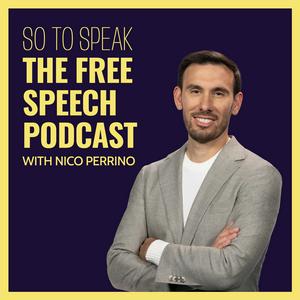Ep. 232: We answer your free speech questions
FIRE staffers take your questions on the TikTok ban, mandatory DEI statements, the Kids Online Safety Act, Trump vs. the media, and more. Joining us: Ari Cohn, lead counsel for tech policy Robert Shibley, special counsel for campus advocacy Will Creeley, legal director This webinar was open to the public. Future monthly FIRE Member Webinars will not be. Become a paid subscriber today to receive invitations to future live webinars. If you became a FIRE Member through a donation to FIRE at thefire.org and would like access to Substack’s paid subscriber podcast feed, please email
[email protected]. Timestamps: 00:00 Intro 00:52 Donate to FIRE! 02:49 TikTok ban 10:01 Ari’s work as tech policy lead counsel 12:03 Mandatory DEI statements at universities 15:19 How does FIRE address forced speech? 18:17 Texas’ age verification law 24:35 Would government social media bans for minors be a First Amendment violation? 33:48 Online age verification 35:17 First Amendment violations while making public comments during city council/school board public meetings 37:25: Edison, New Jersey city council case 39:48 FIRE’s role in educating Americans 41:55 If social media addiction cannot be dealt with like drugs, how can it be dealt with? 43:34 “Pessimists Archive” Substack and moral panics 45:27 Trump and the media 51:23 Gary Gadwa case 52:49 How to distinguish the freedom of speech versus freedom from social consequences? 55:53 Free speech culture is a “mushy concept” 57:58 ABC settlement with Trump 01:01:27 Nico’s upcoming book! 01:02:32 FIRE and K-12 education 01:04:40 Outro Show notes: “TikTok Inc. and ByteDance LTD. v. Merrick B. Garland, in his official capacity as attorney general of the United States” (D.C. 2024) “Opinion: The TikTok court case has staggering implications for free speech in America” L.A. Times (2024) H.B. No. 1181 (Tex. 2023; Texas age-verification law) “The Anxious Generation” Jonathan Haidt (2024) S. 1409 - Kids Online Safety Act (2023-2024) American Amusement MacH. Ass’n v. Kendrick (Ind. 2000) “Edison Township, New Jersey: Town Council bans props, including the U.S. flag and Constitution, at council meetings” FIRE (2024) “LAWSUIT: Arizona mom sues city after arrest for criticizing government lawyer’s pay” FIRE (2024) "President Donald J. Trump v. J. Ann Selzer, Selzer & Company, Des Moines Register and Tribune company, and Gannett Co., Inc.” (2024) “Trump v. American Broadcasting Companies, Inc.” (2024) “New Jersey slaps down censorship with anti-SLAPP legislation” FIRE (2023) “FIRE defends Idaho conservation officer sued for criticizing wealthy ranch owner’s airstrip permit” FIRE (2023) “On Liberty” John Stuart Mill (1859) “Home Depot cashier fired over Facebook comment about Trump shooting” Newsweek (2024) “Free speech culture, Elon Musk, and Twitter” FIRE (2022) “Questions ABC News should answer following the $16 million Trump settlement” Columbia Journalism Review (2024) “Appellants’ opening brief — B.A., et al. v. Tri County Area Schools, et al.” FIRE (2024) Transcript is here
